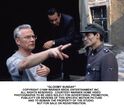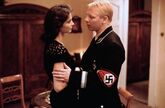1. In the first scene, the German officer died suddenly. When he fell, he grabbed the pearl necklace on his wife's neck. Her wife then crouched down in horror, but the first action was not to check what happened to her husband, but to pick up the beads and even It came out from under the officer's body. All I can say is, whoever gets whoever wife. A mercenary seeks a wife who only sees money. Therefore, it can probably be inferred that the married life of the officers in the past few decades has not been happy, and there is no true love. Therefore, this may be a little comfort to those viewers who feel unwilling to kill him at the age of 80. As the saying goes, the death penalty can be avoided, and the living crime cannot be escaped. In addition, when the last scene continues the story of the first act, the background voice has the media reporting the deeds of the officers: during World War II, more than 1,000 Jews in the city of cloth were rescued. Although, although, he did it for the money, but I think the 1,000+ lives survived anyway. Moreover, in the play, the officer also returned the money of a woman with a kind heart attack, and rescued the woman's uncle according to what he promised at the time. So, I think, that's probably why the writer-director arranged for him to be killed at 80. The arrangement is really delicate. 2. The heroine and the officer have the same birthday. The effect of this detail is in the plot: first, the cause of the heroine's birthday, and secondly the effect of the officer's birthday. In addition, this detail has a deeper meaning, which has been well commented before: angels and devils were born at the same time. This moral can refer to the German officer who started out innocent and then sinister and ruthless, can refer to the angel who took poison to kill (of course, she has good reasons), or it can refer to all of us. 3. I once wondered, so many people want beef rolls, how does the heroine know which dish the officer eats and goes down to the poison? Later, when I re-watched the first scene, I saw that there were 80 ornaments on the officer's plate, and I deliberately gave a close-up shot. Really meticulous. 4. There is a scene in the play where German soldiers go to the restaurant owner's house to arrest someone and pass by the owner downstairs. At that time, the soldier looked up and asked a neighbor who was climbing on the window which floor he lived on. The woman looked at the boss next to the soldier and said, "The third floor." After the soldiers entered the building, the boss nodded slightly to the woman. A little moved, no matter what the world is, there are still many good people after all. And, as the old Chinese saying goes: Great kindness is not appreciated. 5. In the last scene, a pair of wrinkled and old hands happily washes the dishes and empties the poison bottle by the way. The heroine then turns back to celebrate with her son. There are two admirable things about this scene: A. Rinse the empty poison bottle, indicating that the bottle is just empty, and one action lets the audience know what just happened. B, The audience didn't see the old heroine's face, and knew it was her only by the hairpin that was given to her by the boss at the back of her head. Why do this? Just because the restaurateur once said: Angels don't get old. Therefore, the audience can't see the wrinkled beauties, nor can they see the angels throwing poison with their own hands. I can only think of so much for the time being. I like watching films with details, which shows the director's intentions. Also, I haven't figured out who the kid is, after only rewatching the first scene once. I'll take a look later when I have time to see if I can find clues. And if any expert sees it, please give pointers. I wish you all a happy viewing~
View more about Gloomy Sunday reviews











